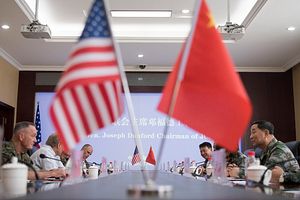On January 19, the U.S. Department of Defense (DoD) published a summary of the 2018 National Defense Strategy (NDS) — the first one under the Trump’s administration.
In line with the National Security Strategy released in late 2017 by the White House, the DoD’s 2018 NDS singled China, together with Russia, out as revisionist powers that are the “central challenge to U.S. prosperity and security.”
China, in response, sharply criticized the United States for its “Cold War mentality.”
“China is a strategic competitor using predatory economics to intimidate its neighbors while militarizing features in the South China Sea,” the 2018 NDS said. “It is increasingly clear that China and Russia want to shape a world consistent with their authoritarian model — gaining veto authority over other nations’ economic, diplomatic, and security decisions.”
The NDS immediately provoked backlash from China. Both the Chinese foreign ministry and defense ministry expressed strong criticism over the DoD report.
On January 21, Ren Guoqiang, spokesperson of the Chinese Ministry of National Defense (MND), said the NDS “was full of unreal assertions of ‘zero-sum’ games and confrontations.”
Ren claimed that rather than seeking “military expansion or sphere of influence,” China has always been “a builder of world peace, a contributor to global development, and a guardian of international order. ”
Regarding the South China Sea issue particularly, Ren insisted that “it is within China’s sovereign rights to carry out peaceful construction activities and deploy necessary defense facilities on islands and reefs of the South China Sea.”
He further referred to the United States — without mentioning the country by name — as a “backstage manipulator” causing militarization in the South China Sea.
“[I]t seems that certain countries do not want to see peace and stability in the South China Sea region and insist on intensifying their own military deployment and presence there,” Ren said. “They are the backstage manipulator for militarizing the region.”
Completely in line with the MND, Chinese foreign ministry spokesperson Hua Chunying also made a lengthy reply at the regular press conference on January 22.
Blaming the NDS for being “fundamentally wrong,” Hua urged the United States to “discard the Cold War mentality” and “stop distorting China’s strategic intention.”
Although both ministries defended China with harsh remarks, compared to the National Security Strategy, the 2018 NDS was actually not such a big surprise for Beijing. The rhetoric in the NDS, abeit still tough, was no more provocative than that in the National Security Strategy.
As The Diplomat has noted earlier, when U.S. President Donald Trump released his first National Security Strategy in mid-December, Hua Chunying made an extremely lengthy response, saying that “It is futile for any country or any report to distort the facts or hurl malicious slander. ”
To some degree, the fact that Trump’s administration has spelled out its aggressive attitude toward China is actually somewhat beneficial to Beijing. Now U.S. policy is clear, and “uncertainty is worse than all,” as Alexander Dumas famously said.

































